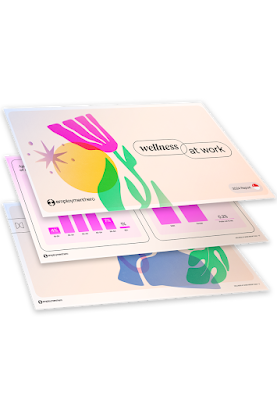 |
| Source: Employment 2024 Hero. Poster for the 2024 Wellness at Work Report. |
The report, which polled 1,018 Singapore employees, found minimal improvement in burnout levels, with 61% of employees feeling burnt out in 2024 compared to 62% in 2022. This underscores that employers have not done enough to manage employee burnout over the past two years, the people, payroll and benefits software provider said.
One of the possible reasons for this stagnation is that a large proportion of employees reported that they do not have access to essential wellness services, such as on-site health assessments, mobile health clinics, comprehensive benefits management, physical fitness and wellness programmes, and mental health support initiatives, Employment Hero suggested.
Only 45% of employees stated that their employer provides access to confidential counselling. These gaps in wellness support and programmes contribute to the persistence of high burnout levels among employees, Employment Hero said.
The group with the highest rates of burnout is Gen Z, with 68% reporting feeling burnt out at work in the past three months. This is followed by 65% of Millennials, 54% of Gen X, and 36% of Baby Boomers.
Employment Hero CEO and co-founder Ben Thompson said: “The findings of our 2024 Wellness at Work Report underscore the urgent need for employers to prioritise mental health and wellness programmes. It's clear that current efforts are insufficient, as evidenced by the persistent high levels of burnout and stress, particularly among younger employees.
"Employers must take proactive steps to provide comprehensive mental health support and wellness initiatives to foster a healthier, more productive workforce. Addressing these issues is not just about improving employee well-being, but also about ensuring sustainable business success in the long term."
Nearly four in 10 (39%) Singaporeans indicated that they had felt stressed at work a few days a week in the last three months, with 36% feeling stressed a few days a month. Again, Gen Zs are struggling the most, with 58% feeling stressed at the workplace a few days a week, compared to 44% of Millennials, 29% of Gen X, and 20% of Baby Boomers.
“Dealing with stress at work is a common challenge that many employees face, and addressing it effectively is crucial for both personal well-being and professional performance,” shared Sudesh T, Head of Diversity, Equity and Inclusion, Manulife Asia.
“Flexible working arrangements, remote work options, and flexible hours so employees can better manage both personal and professional responsibilities can significantly reduce stress and improve overall job satisfaction.”
Highlights include:
● Nearly three in 10 (27%) employees said financial stress and the rising cost of living is the biggest cause of stress
● Under half (47%) of all employees are on track with their financial goals
● About six in 10 (58%) employees don’t think their workplaces are doing enough to support rising living costs
Explore
Download the 2024 Wellness at Work Report report at https://employmenthero.com/sg/resources/wellness-at-work-report/
*Employment Hero’s 2024 Wellness at Work Report is based on an analysis of 1,018 Singaporean employees, focusing on mental health, career wellness, and financial wellbeing. To participate in the survey, respondents had to be employed in any capacity (full-time, part-time, casual, fixed term) and not be business owners. The survey collected responses between April 12 and May 1, 2024. Similar research was also conducted in Malaysia, Australia, New Zealand, and the UK.
